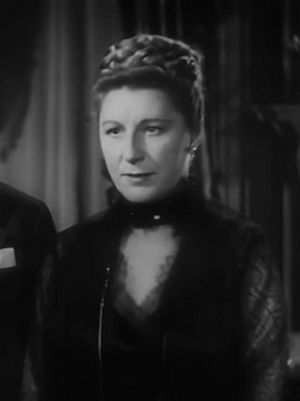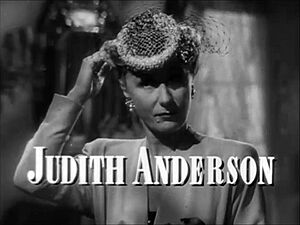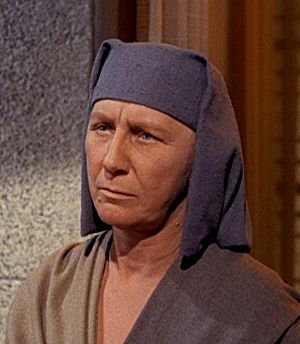Judith Anderson facts for kids
Judith Anderson (born Frances Margaret Anderson on February 10, 1897) was a famous Australian actress. She had a very successful career in plays, movies, and television shows. Many people thought she was one of the best stage actresses of her time.
Judith Anderson won many important awards. She received two Emmy Awards and a Tony Award. She was also nominated for a Grammy Award and an Academy Award. She is remembered as one of the greatest classical stage actors of the 20th century. She passed away on January 3, 1992.
Contents
- Early Life and First Steps in Acting
- Becoming a Star on Broadway and in Films
- Her Role as Mrs. Danvers in Rebecca
- Her Famous Role as Medea
- Acting in the 1960s and Beyond
- Spoken Word Recordings
- Return to Australia and Later Career
- Personal Life
- Death
- Honours and Awards
- Complete Filmography
- Images for kids
- See also
Early Life and First Steps in Acting
Frances Margaret Anderson was born in 1897 in Adelaide, South Australia. She was the youngest of four children. Her mother, Jessie Margaret, used to be a nurse. Her father, James Anderson Anderson, was from Scotland and worked as a sharebroker and explorer.
Frances went to a private school called Norwood. She finished her education there before graduating.
Starting Her Acting Career
She began her professional acting journey in 1915. At first, she used the name Francee Anderson. Her first role was Stephanie in a play called A Royal Divorce at the Theatre Royal in Sydney.
A Scottish actor named Julius Knight was the main star of the company. Judith later said that he taught her many important acting skills. She performed with him in plays like The Scarlet Pimpernel and The Three Musketeers. In 1917, she also toured around New Zealand.
Moving to America
Judith Anderson was very ambitious and wanted to leave Australia. Most actors from her country went to London, England. However, World War I made it hard to travel there. So, she decided to go to the United States instead.
She first went to California but couldn't find any acting jobs for four months. Then, she moved to New York City, but still had no luck. After a difficult time with little money and some illness, she finally found work. She joined the Emma Bunting Stock Company in New York from 1918 to 1919. After that, she toured with other acting groups.
Becoming a Star on Broadway and in Films
Judith Anderson made her first appearance on Broadway in 1922 in a play called Up the Stairs. She then appeared in The Crooked Square in 1923. She also traveled to Chicago for a play called Patches.
A year later, she changed her acting name to Judith. She had her first big success with the play Cobra in 1924. This play ran for 35 performances and helped her become known. She then starred in The Dove (1925), which ran for 101 performances. This role truly made her a recognized actress on Broadway.
In 1927, she toured Australia with three different plays. Back on Broadway, she had a lead role in Anna (1928). She also took over a role in the popular play Strange Interlude in 1929.
Judith Anderson made her film debut in a short movie called Madame of the Jury (1930). Her first role in a full-length movie was in Blood Money (1933).
In 1935, she had a huge hit on Broadway with the play The Old Maid. This play ran for 305 performances and was a big success.
In 1936, Judith played Gertrude in a production of Hamlet. The famous actor John Gielgud played Hamlet, and Lillian Gish played Ophelia. In 1937, she joined the Old Vic Company in London. There, she played Lady Macbeth opposite Laurence Olivier in a famous play.
Her Role as Mrs. Danvers in Rebecca
Judith Anderson's career got a big boost when she was cast in Alfred Hitchcock's movie Rebecca (1940). She played the scary housekeeper, Mrs. Danvers. In the film, her character tried to make the new wife, played by Joan Fontaine, feel terrible. She also reminded the husband, played by Laurence Olivier, about his first wife, Rebecca, who is never seen in the movie.
Rebecca was a huge success with both critics and audiences. Judith Anderson was nominated for an Academy Award for Best Supporting Actress for her role.
After Rebecca, she appeared in several other films. These included Forty Little Mothers (1940) and Lady Scarface (1941).
In 1941, she played Lady Macbeth again in New York. She performed opposite Maurice Evans. She would play this role with him again on television in 1954 and 1960. The 1960 version was even released as a movie in Europe.
She made four more movies at Warner Bros. These included All Through the Night and Kings Row (both 1942).
In 1942–43, she played Olga in Chekhov's play Three Sisters. This production was very famous and even featured on the cover of Time magazine.
Judith Anderson returned to Hollywood for movies like Laura (1944) and And Then There Were None (1945). She also had a rare starring role in Specter of the Rose (1946).
Her Famous Role as Medea
In 1947, Judith Anderson had a huge triumph playing Medea. This was a new version of an ancient Greek play by Euripides. She won the Tony Award for Best Actress for her powerful performance. The play ran for 214 performances, and she later toured the country with it.
Acting in the 1950s
In the 1950s, Judith Anderson continued to act in movies and on television. She made her TV debut in 1951. She also guest-starred on several TV shows.
She returned to Broadway for plays like The Tower Beyond Tragedy (1950). She even toured with Medea in German in 1951.
In 1953, she played Herodias in the movie Salome. She also performed in a play called John Brown's Body, directed by Charles Laughton.
On television, she starred in Macbeth (1954) with Maurice Evans. She won an Emmy Award for Best Actress for this role. She also played Memnet in the epic movie The Ten Commandments (1956).
In 1955, she toured Australia again with her famous play Medea.
In 1958, she played the memorable role of Big Mama in the movie Cat on a Hot Tin Roof. She starred alongside Burl Ives.
She played Medea again for TV in 1959. She also appeared in a TV movie called The Moon and Sixpence with Laurence Olivier.
Acting in the 1960s and Beyond
In 1960, Judith Anderson played Madame Arkadina in Chekhov's play The Seagull. She performed this at the Edinburgh Festival and then at the Old Vic in London.
That same year, she also performed in TV movies like Cradle Song and Macbeth. She won another Emmy Award for her role as Lady Macbeth. She also had supporting roles in movies like Cinderfella (1960).
In 1961, she toured with a special show where she performed scenes from Macbeth, Medea, and Tower.
She received praise for her lead performance in a TV version of Elizabeth the Queen (1968). She then appeared in A Man Called Horse (1970).
In 1970, she achieved a long-time dream. She played the main role of Hamlet in a national tour of the United States and at New York's Carnegie Hall.
Spoken Word Recordings
Judith Anderson also recorded many spoken word albums. These were for Caedmon Audio from the 1950s to the 1970s. She recorded scenes from Macbeth and an adaptation of Medea. She also read verses by Robert Louis Stevenson and passages from the Bible. She even received a Grammy nomination for her work on the Wuthering Heights recording.
Return to Australia and Later Career
Judith Anderson briefly returned to Australia. She guest-starred in a TV show called Matlock Police. She also appeared in the film Inn of the Damned (1974).
In 1982, she returned to the play Medea. This time, she played the Nurse, while Zoe Caldwell played Medea. She was nominated for a Tony Award for Best Performance by a Featured Actress in a Play for this role.
In 1984, she appeared in the movie Star Trek III: The Search for Spock. She played the Vulcan High Priestess T'Lar.
That same year, she started a three-year role on the NBC soap opera Santa Barbara. She played the character Minx Lockridge. When asked why she took the role, she said, "Why not? It's practically the same as doing a play." She was nominated for an Emmy Award for her work on the show.
Her last movies were The Booth and Impure Thoughts (both 1985).
Personal Life
Judith Anderson was married twice. She said that "neither experience was a jolly holiday."
- Her first husband was Benjamin Harrison Lehmann (1889–1977). He was an English professor. They were married in 1937 and divorced in 1939.
- Her second husband was Luther Greene (1909–1987). He was a theater producer. They were married in 1946 and divorced in 1951.
Death
Judith Anderson spent much of her life in Santa Barbara, California. She passed away there in 1992 at the age of 94. The cause of her death was pneumonia.
Honours and Awards
Judith Anderson received several important honours:
- In 1960, she was made a Dame Commander of the Order of the British Empire (DBE). After this, she was often called "Dame Judith Anderson."
- On June 10, 1991, she was appointed a Companion of the Order of Australia (AC). This was to recognize her great service to the performing arts.
Complete Filmography
- Madame of the Jury (1930, Short)
- Blood Money (1933)
- Rebecca (1940)
- Forty Little Mothers (1940)
- Free and Easy (1941)
- Lady Scarface (1941)
- All Through the Night (1942)
- Kings Row (1942)
- Edge of Darkness (1943)
- Stage Door Canteen (1943)
- Laura (1944)
- And Then There Were None (1945)
- The Diary of a Chambermaid (1946)
- The Strange Love of Martha Ivers (1946)
- Specter of the Rose (1946)
- Pursued (1947)
- The Red House (1947)
- Tycoon (1947)
- The Furies (1950)
- Salome (1953)
- Macbeth (1954, TV Movie)
- The Ten Commandments (1956)
- Cat on a Hot Tin Roof (1958)
- The Felizia Kingdom Story (1959 tv series - Wagon Train)
- The Moon and Sixpence (1959, TV Movie)
- A Christmas Festival (1959, TV Movie)
- Cradle Song (1960, TV Movie)
- Macbeth (1960, TV Movie)
- Cinderfella (1960)
- Don't Bother to Knock (1961)
- The Ghost of Sierra de Cobre (1964, TV Movie)
- Elizabeth the Queen (1968, TV Movie)
- The File on Devlin (1969, TV Movie)
- A Man Called Horse (1970)
- The Borrowers (1973, TV Movie)
- The Underground Man (1974, TV Movie)
- The Chinese Prime Minister (1974, TV Movie)
- Inn of the Damned (1975)
- Medea (1983, TV Movie)
- Star Trek III: The Search for Spock (1984)
- The Booth (1985, TV Movie)
- Impure Thoughts (1985)
Images for kids
See also
 In Spanish: Judith Anderson para niños
In Spanish: Judith Anderson para niños
 | Selma Burke |
 | Pauline Powell Burns |
 | Frederick J. Brown |
 | Robert Blackburn |





